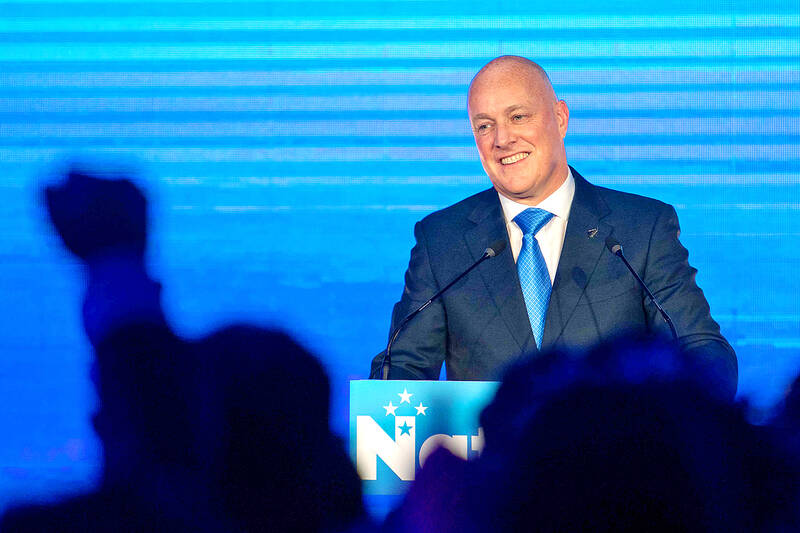New Zealanders yesterday resoundingly elected a new conservative government, with incumbent Prime Minister Chris Hipkins conceding that his center-left Labour party’s six years in power were over.
Hipkins, who replaced charismatic two-term New Zealand prime minister Jacinda Ardern in January, said that he was “not in a position to form a government” and had already congratulated incoming prime minister Christopher Luxon.
“The result tonight is not one that any of us wanted, but I want you to be proud of what we achieved over the last six years,” Hipkins told Labour supporters in Wellington.

Photo: AFP
“On current numbers, it looks like National and ACT will be in position to form the next government,” Luxon added.
With 97 percent of votes tallied, National had 39 percent while Labour trailed on 27 percent.
As the result stood, National could form a government with the support of its ally, the libertarian ACT Party, on 9 percent.
However, they might need the backing of the nationalist New Zealand First party, on 6 percent, to reach a majority in parliament.
Luxon said that New Zealanders had “reached for hope and voted for change.”
The election campaign had been dominated by an increasingly difficult economic situation and a spike in the cost of living that has hit New Zealanders hard.
“My pledge to you is that National will deliver for every New Zealander,” Luxon said, promising to “build the economy and deliver tax relief.”
The 53-year-old, who says he sleeps only five hours a night, completed a rapid political ascent. Only four years ago he was working in the private sector.
He spent seven years as CEO Air New Zealand, and was hailed a future leader upon entering politics in 2019.
In their first 100 days in office, National plan a crackdown on youth offending, a ban on cellphones in schools and a scrapping of the Labour government’s planned fuel tax hikes.
“New Zealanders are going to wake up to not only a new day, but the promise of a new government and a new direction,” Luxon told supporters in Auckland. “I cannot wait to get stuck in and get to work because New Zealand has chosen change and we will get this country back on track.”
Labour’s support has collapsed from 50 percent at the 2020 election, when Ardern led the party to the first outright majority since New Zealand switched to a proportional representation system in 1996.
“I did know when I took on this job that it was going to be an uphill battle,” Hipkins told supporters. “No government has replaced a prime minister in an election year and carried on to win. I gave it my all to turn the tide of history, but alas, that was not enough.”
Additional reporting by Bloomberg

WAITING GAME: The US has so far only offered a ‘best rate tariff,’ which officials assume is about 15 percent, the same as Japan, a person familiar with the matter said Taiwan and the US have completed “technical consultations” regarding tariffs and a finalized rate is expected to be released soon, Executive Yuan spokeswoman Michelle Lee (李慧芝) told a news conference yesterday, as a 90-day pause on US President Donald Trump’s “reciprocal” tariffs is set to expire today. The two countries have reached a “certain degree of consensus” on issues such as tariffs, nontariff trade barriers, trade facilitation, supply chain resilience and economic security, Lee said. They also discussed opportunities for cooperation, investment and procurement, she said. A joint statement is still being negotiated and would be released once the US government has made

NEW GEAR: On top of the new Tien Kung IV air defense missiles, the military is expected to place orders for a new combat vehicle next year for delivery in 2028 Mass production of Tien Kung IV (Sky Bow IV) missiles is expected to start next year, with plans to order 122 pods, the Ministry of National Defense’s (MND) latest list of regulated military material showed. The document said that the armed forces would obtain 46 pods of the air defense missiles next year and 76 pods the year after that. The Tien Kung IV is designed to intercept cruise missiles and ballistic missiles to an altitude of 70km, compared with the 60km maximum altitude achieved by the Missile Segment Enhancement variant of PAC-3 systems. A defense source said yesterday that the number of

‘CRUDE’: The potential countermeasure is in response to South Africa renaming Taiwan’s representative offices and the insistence that it move out of Pretoria Taiwan is considering banning exports of semiconductors to South Africa after the latter unilaterally downgraded and changed the names of Taiwan’s two representative offices, the Ministry of Foreign Affairs (MOFA) said yesterday. On Monday last week, the South African Department of International Relations and Cooperation unilaterally released a statement saying that, as of April 1, the Taipei Liaison Offices in Pretoria and Cape Town had been renamed the “Taipei Commercial Office in Johannesburg” and the “Taipei Commercial Office in Cape Town.” Citing UN General Assembly Resolution 2758, it said that South Africa “recognizes the People’s Republic of China (PRC) as the sole

Taiwanese exports to the US are to be subject to a 20 percent tariff starting on Thursday next week, according to an executive order signed by US President Donald Trump yesterday. The 20 percent levy was the same as the tariffs imposed on Vietnam, Sri Lanka and Bangladesh by Trump. It was higher than the tariffs imposed on Japan, South Korea and the EU (15 percent), as well as those on the Philippines (19 percent). A Taiwan official with knowledge of the matter said it is a "phased" tariff rate, and negotiations would continue. "Once negotiations conclude, Taiwan will obtain a better